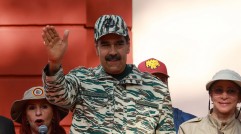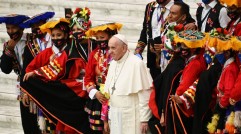Venezuelan Opposition Loses Supermajority
Venezuela's opposition on Jan. 14 lost the supermajority it had won in the country's Dec. 6 legislative elections, deciding to cave in to a Supreme Tribunal ruling preventing three of its lawmakers from being sworn in.
The pragmatic move aims to end a stalemate between the country's legislative and judicial branches that had arisen after the court, stacked with supporters of embattled President Nicolás Maduro, began investigating three newly elected parliamentarians from the state of Amazonas, The Wall Street Journal reported.
Court threatened to void parliament's votes
The tribunal had warned that all of the National Assembly's decisions would be void if the three legislators were sworn in. The body's newly elected president, Henry Ramos, backed down from his initial rejection of the order in an apparent attempt to gain control of the situation.
"I want to state for the record that we have complied, respected and obeyed the Supreme Court ruling," Ramos said.
After the three lawmakers were removed as subjects of an inquiry into alleged vote-buying, the opposition alliance now only consists of a total of 109 lawmakers. That means the coalition lacks the supermajority needed to rewrite the constitution and possibly unseat Maduro, the newspaper explained.
Lawmakers: End 'institutional ambush'
The ousted lawmakers themselves told their would-be parliamentary colleagues that they "completely rejected" the Supreme Tribunal's ruling, but that they were willing to give up their seats to "help free parliament from the institutional ambush" prepared by Maduro and his supporters, the BBC reported.
They denied any wrongdoing and accused the Venezuelan government of fabricating the vote-buying allegations to limit the power of forces opposed to Maduro's administration.
Anabella Abadi, an analyst at Caracas-based consultancy ODH Grupo Consultor, meanwhile, told The Wall Street Journal that the opposition's decision may turn out to be a smart move, as it tries to roll back the president's socialist policies and stabilize the Venezuelan economy.
"This was a tactical decision by the opposition alliance to preserve their ability to legislate," she explained. "This, however, does limit (opposition lawmakers') more ambitious plans for reform."
Subscribe to Latin Post!
Sign up for our free newsletter for the Latest coverage!













